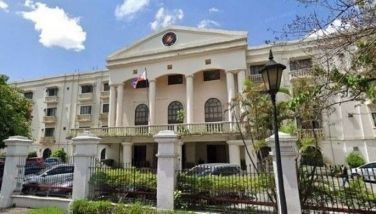AFP retakes island in mock combat as China’s navy watches
MANILA, Philippines — As Chinese warships and maritime militia vessels watched from a distance, various units of the Armed Forces of the Philippines (AFP) engaged in interoperability exercises in the West Philippine Sea (WPS) on Wednesday, simulating the retaking of an island from enemy forces.
As part of this year’s “Armed Forces Joint Exercise Dagat-Langit Lupa,” combined units from the Philippine Navy, Philippine Air Force (PAF) and the Philippine Army simulated clashes with enemy forces to reclaim Kota Island.
“This is not the first time that we conducted this kind of exercise, the island seizure, but this was the first time it was held on Kota Island so you can see that while we’re doing the exercise, there were ships around sent by our neighbors,” AFP chief Gen. Romeo Brawner Jr. said.
“We saw People’s Liberation Army Navy ships of China as well as militia vessels surrounding our area,” he said.
He stressed the presence of foreign vessels in the vicinity did not affect the conduct of the exercise, as the AFP was actually expecting the Chinese to send ships to do some monitoring.
“We are expecting it already as I said, because this is the first time that we did the exercise in this area and apparently they’re curious about what we’re doing. But we welcome that, it adds realism to the exercise,” he said.
“We can also say that we are warning our neighbors or whichever external forces that we are capable of defending our islands. And not only that; we are capable of defending our islands unilaterally, meaning, just us,” Brawner said.
The AFP chief said unilateral exercises were important because in the event of external attacks, the Philippines would have to initially rely on itself for defense “before we ask help from other countries like our allies or our partners.”
The simulated retaking of Kota Island ended with a PAF aircraft doing a bundle drop of supplies and provisions for troops who have recaptured the island.
The island retaking exercise involved the BRP Ramon Alcaraz which disgorged troops on rigid hull inflatable boats for a beach assault.
Troops then carried out a mechanized assault to reclaim the island while the PAF’s NC212i aircraft later provided logistical support by dropping essential supplies, including food and equipment to soldiers securing the island.
“This exercise marks a significant step in strengthening our national defense capabilities and ensuring that we are prepared to defend our sovereignty and sovereign rights. Today, our forces demonstrate the unwavering commitment to protecting the West Philippine Sea and our nation’s future,” Brawner said in a statement.
The AFP said the exercise underscores the military’s efforts to enhance its external defense capabilities as the training “also serves as a critical demonstration of the country’s firm resolve to defend our territorial integrity in the maritime areas of the West Philippine Sea.”
The Philippine Coast Guard (PCG), meanwhile, announced that 40 fast patrol crafts to be acquired from France would be deployed in the West Philippine Sea.
“Definitely some will be deployed there. But (as) to how many, we will determine that at the right time,” PCG Commandant Adm. Ronnie Gil Gavan said at a press briefing yesterday at Malacañang.
“This will form part of the mix of capabilities we have. As to their specific capabilities, I think we should leave it with us for the moment. But rest assured that this will form part of the force mix that we need to address the threats in the area,” he added.
Marcos approved the purchase of 40 fast patrol crafts from France during a meeting of the National Economic and Development Authority board last Tuesday. The project, which seeks to boost the Philippines’ maritime defense capabilities, would be funded through a P25.8-billion official development assistance from the French government. Twenty of the 40 units will be assembled in the Philippines.
“It is the largest, so far, single-purchase in the modernization of the Philippine Coast Guard. It is a game-changer for us. It will enable the Philippine Coast Guard to have at least two patrol boats in every district, fast enough to reach edges of our socio-economic zone forms to enforce the laws,” Gavan said.
‘Ambassadors’
At the Manila Dialogue on the South China Sea on Wednesday, President Marcos called on Filipinos to be “ambassadors” for the country’s cause in the West Philippine Sea, as he cited the need for more urgency in crafting a binding code of conduct among nations with claims in the South China Sea.
“Keeping with the hope of open dialogue, we will eventually continually pursue broad public diplomacy and awareness efforts. We seek to empower our citizens to become ambassadors for our cause and foster a profound national consciousness of our interest in the West Philippine Sea,” Marcos said in a speech read for him by Executive Secretary Lucas Bersamin.
In his message, Marcos said the Philippines maintains a strategic presence in the West Philippine Sea in accordance with international law, the United Nations Convention on the Law of the Sea, and the 2016 arbitral award.
The Philippines also rejects and denounces “excessive claims” and “aggressive actions” as they undermine the rule of law and the very principles that ensure peace and stability in the region, he added.
“As we inform our citizens and the global community, we foster a deep appreciation for the rule of law and garner broader support for our position,” he said.
The President said the government, through the National Maritime Council, has adopted unified messaging on West Philippine Sea-related matters and on coordinating communications on developments and related concerns.
“The Philippines is sincere, frank, and candid in these exchanges, while also firm and unequivocal about the national position and the need to uphold international law,” he added.
“As regards the Code of Conduct on the South China Sea, we recognize that there should be more urgency in the pace of negotiations and that it is time to tackle the code’s milestone issues directly so we can make substantive progress moving forward,” the Chief Executive said.
In a chance interview, Bersamin said there is no need to worry about the continuity in the relations between the Philippines and the US under the presidency of Donald Trump.
“The Philippines and America have shared history and we have this desire of peace in this region so I think the commitments will be followed through,” the executive secretary said. – Alexis Romero, Jose Rodel Clapano
- Latest
- Trending





























